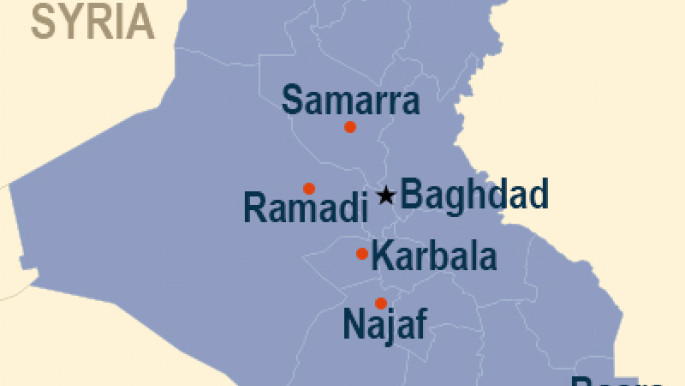As many as 20 million pilgrims will head to Karbala to commemorate Arbaen [Anadolu]
It has been described as the most dangerous march in the world.
Still, millions of Shia Muslims - and some Sunnis - are taking part in Arbaen commemorations this year despite the threat of bombs from the Islamic State group.
The pilgrims will traverse hundreds of kilometres of road to reach Karbala by foot.
Tight security
Although heavy security lines the route, the worst was imagined on Monday when a bomb exploded killing at least nine pilgrims.
The marches have been regularly targeted by militants since a ban on Arbaen commemorations was lifted after Saddam Hussein was overthrown in 2003.
 |
|
Roadside bombs have hit processions in Diyala, Kirkuk and south Baghdad so far this year, while other potential attacks have been foiled.
Despite the threat of more bombings, the pilgrims keep on coming, determined to make it to Karbala for one of the world's biggest religious gatherings in a few days.
As many as 20 million other Shias from across the world - including 3 million Iranians - will take part in commemorations for the death of Imam Hussein in Karbala this year.
Imam Hussein is seen as one of the figureheads of Shia Islam and died in a battle that took place in the city 13 centuries ago.
The Battle of Karbala had a lasting impact on relations between Sunni and Shia Muslims, and no more so than in Iraq.
In the north of the country a war between government forces, allied Shia militias, Kurdish fighters, and the Islamic State group is raging.
The rise of IS is very much built on sectarian politics - which many analysts explain as Sunni disillusionment at their second-class position in Iraqi society after the fall of Saddam Hussein.
Arbaen - meaning "forty" - takes place 40 days after Ashura, and will be held this year on 2 December.
"The walk is non-obligatory but strongly recommended act from a Shia Islam viewpoint," said the Iraq Live Update team, who have been following the march to Karbala.
"It is to show support to Imam Hussain's stance against tyranny and oppression during his time but also show defiance to oppression now."
During Saddam Hussein's rule to event was banned and contributed to growing resentment towards the mostly tribally Sunni regime.
"Walking on Arbaen meant death at the time of Saddam," said the team.
"We have family members who were executed during Saddam times purely because of walking in Arbaen."
Resurgance
In 1977 the last Arbaen took place during Baathist rule and ended in a massacre.
Hundreds of Shia pilgrims were rounded up and killed by security forces for taking part in the march on the orders of the then Vice-President Saddam Hussein.
Arbaen carried huge political significance for disenfranchised Iraqis and became associated with dissent.
As did the funerals and mourning periods for any pilgrims killed by Iraqi forces during the commemorations for Hussein. The emotional mix became potentially explosive.
Now, the event is a more organised and the marchers have the protection of the Iraqi government and army.
Residents in towns and villages often join together to open Mawkeb receptions in tents, in buildings or on the roadside to offer refreshments to the walkers.
"Out of love, people offer what they can... they beg walkers to accept their invitation because they see as 'honourable guests' of Imam Hussain," said the team.
Residents often offer accommodation, food, drinks, medical services, use of phones and chargers, and repair prams or shoes for free for the pilgrims.
Around 30,000 security forces have been deployed to protect the procession from what many in the crowd might view as Iraq's modern day oppressors - the Islamic State group.
"One of the key messages for people is defiance, hence while security is important it comes second or third in people's mind. It is an annual demonstration of solidarity with Imam Hussain and his cause.
This controversially includes members of the Popular Mobilisation Forces, largely Shia militias that are part of the Iraqi Security Forces but accused of enormous human rights abuses by NGOs.
"They play a vital role as they are motivated by their appreciation and understanding of the importance of Arbaeen rather than doing as a job," said the Iraq Live Update team.
"Most are locals with excellent knowledge of the area [the procession pass through] and strong family or tribal connections to pick up the latest news or intelligence."
Many of their fighters are taking part in the encirclement - and imminent offensive on IS-held Ramadi in western Iraq - a war many on both sides of the religious divide see as sectarian-driven.
However, calls for reforms and mass protests in Iraq have gave hope that Prime Minister Haider al-Abadi was serious about ending endemic power shortages, corruption and killings.
This might have stalled but many hope they will eventually be pushed through by Adadi after a new set of reforms was unveiled by the PM earlier in November.
For many of the pilgrims, the march to Karbala is a trial of of faith and endurance amid the pain of an ongoing civil war with just a little optimism thrown in for the future of Iraq.







 Follow the Middle East's top stories in English at The New Arab on Google News
Follow the Middle East's top stories in English at The New Arab on Google News


